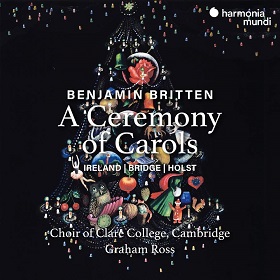It’s a bold director who decides to explore Benjamin Britten’s smaller and relatively minor choral repertoire alongside the seldom recorded SATB version of A Ceremony of Carols. As the booklet notes explain, Graham Ross has been a devotee of Britten since childhood and admires the composer’s “understanding of the poetry and inflexions of language”. Whether we like his music, it’s safe to say we all tip our hats to Britten’s natural gifts. But in compiling a disc of his choral works we may not necessarily think to combine settings of well-known Christmas texts with those for the liturgical service of Matins. Around Julius Harrison’s 1955 arrangement of A Ceremony of Carols, Ross has programmed a selection of church offerings and grouped them alongside several ‘bottom drawer’ works and a handful by three composers who were an important early influence for Britten. For those unfamiliar with his ‘small change’, there will be some welcome discoveries, and if the rearrangement of his great carol assemblage may not appeal to everyone (even Britten supposedly regretted agreeing to Harrison’s adaptation), the singing is delightfully fresh and invigorating.
It comes as no great surprise these two qualities define the singing on this disc and since this is an Oxbridge choir, musicianship comes as standard, with young voices really engaging with music and text. Britten’s atmospheric ‘Sweet was the song the Virgin’ (from the five-movement Christmas Suite Christ’s Nativity written when he was only in his second term at the RCM and later revised in 1966) is given a fine, pure-voiced rendition by the upper voices and soloist Lottie Greenhow – a flowing, spacious account sung with affection and abundant sensitivity. The astonishingly mature A Hymn to the Virgin is mostly given a well-fashioned and initially dignified performance until an over-emphatic “Lady, flow’r of ev’rything” disturbs its earlier blend and control.

Sometimes the singers’ enthusiasm for Britten’s music gets the better of them and in some ways that’s no bad thing since plenty of excitement is created. That said, Gustav Holst’s 1916 text-laden partsong This have I done for my true love (No. 1 from the Three Carols for unaccompanied chorus) feels a little harried, its all-encompassing narrative (birth, death and ascension) needing, at times, a simpler, more fleet-footed expression. From three years earlier comes the original piano version of The Holy Boy by John Ireland (Britten’s composition tutor at the RCM) which was to generate over a dozen arrangements and in 1941 an a cappella version for the BBC Singers to words by Herbert Brown, the family solicitor. This rendition is pleasantly lilting, its wistful aspect lovingly conveyed with warmth and wide-eyed wonder. Frank Bridge was Britten’s most influential teacher, his name enshrined in an outstanding set of string variations. The musical language of his partsong Music, when soft voices die (1904)pays tribute to his former teacher Charles Villiers Stanford. Restrained and heartfelt, this account perfectly denotes ideas of memory so evocatively and suggested by Percy Bysshe Shelley.
Elsewhere, amongst the unaccompanied Britten settings, Ross has his foot on the pedal for The Sycamore Tree, its joyfulness readily apparent if somewhat over-egged. Less frenetic is Britten’s rarely sung arrangement of The Holly and the Ivy, writtenfor an Aberdeen choir in 1956,its word change at “The playing of the merry harp” adding some curiosity to an otherwise unremarkable setting. Amongst Britten’s church music there can be few pieces so overlooked as his a cappella war time anthem Deus in adjutorium meum intende (Psalm 70 ‘Haste thee O God to deliver me’). Notwithstanding some unclear diction, the choir respond well to David’s urgent pleas for rescue from his enemies, prayers that would have had powerful resonance in wartime Britain in 1945 when it was completed as incidental music to a radio play This Way to the Tomb by Ronald Duncan.
A Hymn of St Columba (1962) is a suitably muscular affair, the urgency of St Columba’s missionary ardour well caught by choir and organist Eleanor Carter. Within Britten’s early Te Deum in C (1934) Helena Mackie proves to be a beguiling soloist and the choir make the most of the stylistic contrasts in the Hymn to St Peter. Jessica Hopkins’s assertions to St Peter are as assured as the Jubilate Deo is exuberant.
Britten’s A Ceremony of Carols needs no advocacy, but there will be some for whom the original for three-part upper voices and harp has no comparison. Yet this is a highly respectable account, and the spirit of the 1942 version (written on board M.S. Axel Johnson on his return from America to Britain) remains intact. If one ignores the choral scholars’ temptation to push on rather excitedly near the end of ‘This little Babe’, tempi are well controlled, and there’s clear definition between the voices and Tanya Houghton’s harp. Solos are nicely judged, impressively so in ‘Balulalow’, ‘In freezing winter night’ and ‘Spring Carol’ and the plainsong passages are eloquently delivered. Altogether, it’s a disc well worth exploring, not least for its curiosity value, informative booklet notes and the stunning pianissimo singing achieved in ‘A New Year Carol’ that closes this absorbing disc.
David Truslove
Tanya Houghton (harp), Eleanor Carter and Ashley Chow (organ), Graham Ross (conductor),
Choir of Clare College, Cambridge
Britten – The Sycamore Tree, Te Deum in C, Jubilate in C, Deus in adjutorium meum intende, A Hymn to the Virgin, A Hymn of St Columba, Hymn to St Peter; Ireland – The Holy Boy; Bridge – Music, when soft voices die; Holst – This have I done for my true love; Britten – The Sycamore Tree, The Holly and the Ivy, Sweet was the song the Virgin sung, A Ceremony of Carols, A New Year Carol.
harmonia mundi HMM 905329 [74.58]
Above: Choir of Clare College, Cambridge (c) Nick Rutter